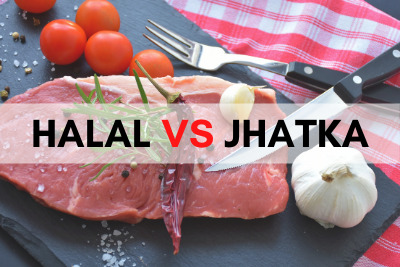
Animal slaughter for human consumption is governed globally by numerous legislations to protect the animal health aspect of the process; many of those various regulations and actions are intended to guarantee that the livestock are slaughtered in a hygienic and humane manner. However, in many nations, these same laws prohibit religious animal slaughtering activities from adhering to the ethical nature of this method, which is a major departure from the perspective of animal protection.
Kosher and halal are two of the most widely used religious animal slaughter processes worldwide; legally, they are separate terms for the same practise practised by Jews and Muslims, respectively. People of two Indian sects, Hinduism and Sikhism, have historically followed the Jhatka slaughter method.
Before we bust the fallacy of whether raw halal meat or Jhatka meat is better, let us first define Halal and Jhatka. In layman's words, Halal refers to the Islamic method of slaughter, while Jhatka refers to the non-Islamic method of slaughter. 'Halal' is an Arabic term that corresponds as "permissible" in English, indicating that it follows Islamic law.
Jhatka and Halal slaughtering methods
During halal slaughter, a sharpened knife is used at the ventral (front) portion of the animal's neck and the trachea, oesophagus, carotid arteries, jugular veins, and vagus nerve are truncated to cause the blood to flow out of the body before the animal dies. This ventral neck incision (VNI) procedure guarantees that the spinal nervous system remains stable before the animal dies. As this is going on, a devotion known as Tasmiya is being recited. So, Halal is ceremonial meat given to Allah, and Muslims are expected to consume only fresh halal mutton and refuse anything not offered to Allah.
In comparison, in the jhatka method of slaughter, the cut is rendered at the dorsal (back) side of the neck to dislodge the whole spinal column from the skull; this results in not only cervical dislocation but also decapitation (beheading) in a single strike, and therefore a stronger sharpened object is used. So Jhatka is a form of slaughter in which an animal is killed immediately with a single strike, with no need for the animal to bleed steadily for a period of time before dying.
Although some citizens believe that Halal is better, experts disagree. It's impossible to tell whether there are any dietary variations between the two. There have been no tests conducted on people who eat fresh halal chicken or mutton to see whether their cholesterol levels vary or something of the sort.
Scientifically, Halal and Jhatka are compared
Normally, any emotion sensed in our bodies (somatic cells) is experienced by cognate receptor proteins and then conveyed to the brain through nerves (collection of neurons) via the spinal cord. The brain's reaction is again conveyed by the nerves of the spinal cord and manifested by the body's effector muscles. In the case of halal slaughter, this spinal nerve system is purposefully not interrupted, whereas in the case of jhatka, it is immediately blocked; therefore, the sense of pain is bound to be lost automatically in the jhatka process, while in the case of halal, the pain sensation is conveyed from the brain before the animal dies.
Various groups of experts from across the world have repeatedly presented data to show that during the kosher/halal method of slaughter, animals are subjected to a great deal of tension; in the case of cows/bulls and goats, the levels of three stress hormones, cortisol, nor-adrenaline, and dopamine, rise by 30-50 percent. This is due to the fact that most of our hormones, like all stress hormones, are neuronally regulated by hypothalamic secretions from our brain.
The Value of Cleanliness
The most important rule of halal meat is cleanliness. This critical quality must be followed by the butchers and farmers who slaughter the meat. This ensures that they are provided with tidy living quarters. They often obtain nutritious and sanitary food. When an animal is ill, it cannot be killed.
When the head of an animal is severed using the jhatka procedure, the blood clots because it hasn't had a chance to flow out of the body of its own accord. This meat must then be washed again since blood clots will cause the meat to spoil faster.
This, in fact, causes rigour mortis and the longer the meat is held out of cold storage, the more likely it is to develop rigour mortis and thereby shrink and harden. Technically, this means the halal meat is more juicy, remains fresher for longer, and shrinks less. Although all of these points are true, there is an assertion that the meat has a fuller flavour when cooked in the Jhatka process. There is no proof to support this, but it is something that many Jhatka meat enthusiasts believe.
The ideal circumstances
The meat is in excellent eating shape thanks to a safe living environment and this method of slaughter. Another significant advantage is that the animal cannot be butchered while sick. When the animal is handled equally, they are less stressed when killed. This ensures that the meat is softer, because the animal's stress is not eaten by you.
So now you have it, these are the facts you should be aware of the next time there is a debate about whether Halal or Jhatka meat should prevail. That being said, I have had both types of meat; from several shops of jhatka and halal meat near me, and I still can't tell the difference between the two. I believe it has a lot to do with how meat is served, and much more specifically, how it is prepared for cooking. Get jhatka or halal meat delivery from Ghiza Foods - just remember to enjoy your meal to the fullest.